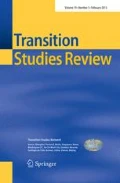Abstract
Some researchers in the field of public policy seek to explain the relationship between policymaker’s values and policy change. In this regard some theories have dominated the literature over the past decades; the most important ones are March and Olsen’s “Garbage Can Model”, Kingdom’s “policy streams,” and “Advocacy Coalition Framework”. These theories seek to build a theory of chaotic policymaking situation which will lead to anarchic and radical policy change. In this article, we posit a methodological innovation in the area of policy change by introducing the “Ideological Dualism” hypothesis into the policy change theory which occurs in ideological regimes like the Islamic Republic. This integration is accomplished through a study of the nature of the Islamic political philosophy and Iranian nationalism and the advocates of these ideas in policymaking system. The results help to further explain policy change and the role that various values play in prompting policy change or maintenance of the status quo.



Similar content being viewed by others
References
Baumgartner FR, and Jones BD (1993) Agendas and instability in American politics. University of Chicago Press, Chicago
Chevalier G (2008) Rationalités, référentiels et cadresIdéologiques, SociologieS [En ligne], URL: http://sociologies.revues.org/index2023.html
Cohen M, March J, Olsen JP (1972) Garbage can model of decision-making. Adm Sci Q 17:1–25
Crooke A (2009) Resistance; the essence of the islamist revolution. Pluto Press, London
Erdbrink T (2009) Iranian Leader Rival Express sharply Divergent Views in Debate, Washington Post, [online at:] www.washingtonpost.com/wp-dyn/content/
Fischer F (1980) Politics, values, and public policy: the problem of methodology. Westview Press, Boulder
Gheleji H (2007) E-government policy-making in Iran. Farhange Danesh J 1(2):127–157
Iran Human Rights Center (2009) Iran’s parallel intelligence apparatus, URL: http://www.iranhrdc.org/httpdocs/English/pdfs/Reports/Covert%20Terror%20Summary%204.24.09.pdf
John P (2003) Analysing public policy. Pinter Publishers, London
Jones MD, Jenkins-Smith HC (2009) Trans-subsystem dynamics: policy topography, mass opinion, and policy change. Policy Stud J 37(1):37–58
Kingdon J (1984) Agendas, alternatives and public policies, 2nd edn. Harper Collins, New York
Lindblom C (1959) The science of muddling through. Public Adm Rev 19:79–88
March J, Olsen JP (1976) Ambiguity and choice in organizations. Norwegian University Press, Bergen
March JG, Olsen JP (1989) Rediscovering institutions: the organizational basis of politics. Free Press, NY
McBeth MK et al (2007) The intersection of narrative policy analysis and policy change theory. Policy Stud J 35(1):87–108
Merriam-Webster Online Dictionary (2009) URL: http://www.merriam-webster.com/dictionary
Muller P (2000) L’analyse cognitive des politiques publiques: vers une sociologie politique de l’action publique, Revue française de science politique 50(2)
Padgett JF (1980) Managing garbage can hierarchies. Adm Sci Q 25(4):583–604
Parliament (1980) Islamic Republic Constitution, Tehran
Sabatier PA (1999) Theories of the policy process. Westview Press, Boulder
Sanati K (2007) Nuclear spy deeps Iran’s split, Asia Times, URL: www.atimes.com/middle_East/Il07Ak01.html
Vahid M (2005) A look at the policymaking problems in Iran with regard to référentiels. Law Polit Sci J 69:317–330
Author information
Authors and Affiliations
Corresponding author
Additional information
Note from the Editor-in-Chief: The situation in Iran has changed after the presidential elections. New initiatives and approaches are at this very moment discussed with the Group 5 + 1 and specifically within the initiative taken by President Obama. This submission by a PhD student from Teheran University is the first Iranian contribution ever hosted by Transition Studies Review. We encourage an opening to further cooperation and thus welcome any new submissions of papers from Iran.
About this article
Cite this article
Gheleji, H. Value Contradiction in Policymaking: The Case of Iranian Foreign Policy. Transit Stud Rev 20, 443–451 (2013). https://doi.org/10.1007/s11300-013-0293-3
Published:
Issue Date:
DOI: https://doi.org/10.1007/s11300-013-0293-3




